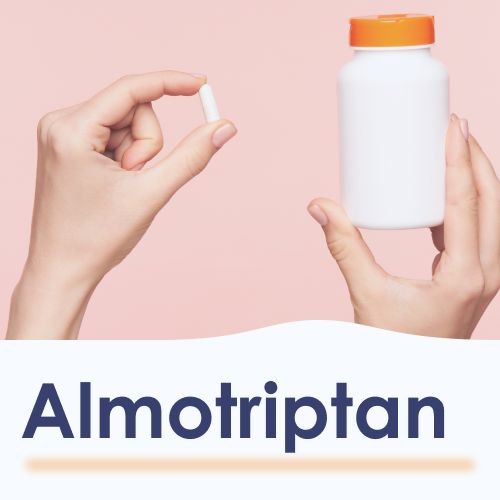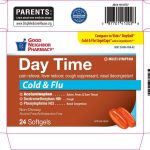
Almotriptan – Oral, Axert
Medication Uses How To Use Side Effects Precautions Drug Interactions Overdose Notes Missed Dose Storage
USES: Almotriptan is used to treat migraines. It helps relieve headaches, pain, and other migraine symptoms, including sensitivity to light/sound, nausea, and vomiting. Prompt treatment allows you to return to your normal routine and may reduce your need for other pain medications. Almotriptan does not prevent future migraines or reduce their frequency. It belongs to a group of drugs called triptans, which affect serotonin, a natural chemical that constricts blood vessels in the brain and may also block other pain pathways in the brain.
HOW TO USE: Read the Patient Information Leaflet from your pharmacist before starting almotriptan and each time you get a refill. Ask your doctor or pharmacist if you have any questions. Take this medication by mouth at the first sign of a migraine or as directed by your doctor. It may be taken with or without food. Do not use almotriptan to prevent migraines. If your symptoms are only partially relieved or if your headache returns, you may take a second dose after 2 hours or as directed by your doctor. Do not take more than 2 doses in a 24-hour period. If you have never taken this medication before and have risk factors for heart disease (see Precautions), your doctor may advise you to take your first dose in their office to monitor for rare but serious heart problems. Your dosage is based on your medical condition and response to therapy. Tell your doctor if your condition does not improve or if it worsens.Overuse of drugs to treat sudden migraine attacks can worsen headaches or cause rebound headaches. Therefore, do not use this medication more often or for longer than prescribed. Tell your doctor if you need to use this medication more frequently or if it is not working as well as before. Your doctor may need to adjust your medication or prescribe an additional medication to prevent headaches.
SIDE EFFECTS: The most common side effects include drowsiness, dizziness, nausea, tingling/numbness, prickling sensations, and dry mouth. If any of these effects persist or worsen, notify your doctor. Remember that your doctor has prescribed this medication because the benefits outweigh the risks of side effects. Chest/jaw/neck tightness may occur briefly after using almotriptan, but this is usually not a sign of a serious condition. Seek immediate medical attention if you experience serious side effects such as chest pain, jaw/left arm pain, fainting, irregular heartbeat, vision changes, weakness on one side of the body, confusion, slurred speech, severe stomach/abdominal pain, bloody diarrhea, changes in urine amount. Contact your doctor immediately if you experience blue fingers/toes/nails, cold sensation of hands/feet, hearing changes, or mental/mood changes. Rarely, this medication may increase serotonin and cause a serious condition called serotonin syndrome/toxicity. Tell your doctor or pharmacist about all the drugs you take to reduce the risk. Seek immediate medical help if you develop symptoms such as fast heartbeat, hallucinations, loss of coordination, severe dizziness, severe nausea/vomiting/diarrhea, twitching muscles, unexplained fever, unusual agitation/restlessness. If you have a serious allergic reaction, seek immediate medical attention. Symptoms of a serious allergic reaction include rash, itching/swelling (especially of the face/tongue/throat), severe dizziness, trouble breathing. This is not a complete list of possible side effects. Contact your doctor or pharmacist if you notice any other effects.
PRECAUTIONS: Before taking almotriptan, inform your doctor or pharmacist if you are allergic to it, other triptan migraine drugs, or if you have any other allergies. This product may contain inactive ingredients that can cause allergic reactions or other problems. Consult your pharmacist for more information. Avoid using this medication if you have certain medical conditions, such as heart disease, decreased blood flow in the brain, blood circulation disease, uncontrolled high blood pressure, or certain types of headaches. Talk to your doctor or pharmacist about your medical history, especially if you have certain blood circulation disorders, kidney problems, or liver problems. Inform your doctor if you have risk factors for heart disease, such as diabetes, a family history of heart disease, high blood pressure, high cholesterol, being overweight, smoking, being female after menopause, or being male over the age of 40. If you are at high risk for heart disease, your doctor may want to check your heart before prescribing almotriptan. This drug may cause dizziness or drowsiness. Avoid driving or using machinery until you are sure you can perform these activities safely. Limit alcoholic beverages. Use this medication during pregnancy only when clearly needed and under the supervision of your doctor. It is not known if this drug passes into breast milk, so consult your doctor before breastfeeding.
DRUG INTERACTIONS: Almotriptan may interact with other drugs and increase your risk for serious side effects. Keep a list of all the products you use and share it with your doctor and pharmacist. Do not start, stop, or change the dosage of any medicines without your doctor’s approval. Other medications can affect the removal of almotriptan from your body, which may affect how it works. Examples include certain antifungal medications, macrolide antibiotics, and protease inhibitors. The risk of serotonin syndrome/toxicity increases if you are taking other drugs that increase serotonin. Examples include street drugs, St. John’s wort, and certain antidepressants. If you also take ergotamine medication or other triptan drugs, separate your almotriptan dose from these other medications to reduce the chance of serious side effects. Consult your doctor for the recommended time interval between doses. Inform your doctor or pharmacist if you take drugs that cause drowsiness, as this medication can intensify that effect. Check the labels of all your medicines, including cough-and-cold products, for added drowsiness-causing ingredients. Ask your pharmacist about the safe use of these products.
QUESTION
OVERDOSE: If overdose is suspected, contact a poison control center or emergency room immediately. US residents can call their local poison control center at 1-800-222-1222. Canada residents can call a provincial poison control center. NOTES: Do not share this medication with others. Take this medication only as needed when a migraine occurs, as directed by your doctor. It should not be taken on a regular schedule or in increased doses without medical guidance. Certain triggers like foods/beverages or lifestyle patterns may bring about migraines, so consult your doctor for advice on avoiding them. Periodic medical tests may be necessary to monitor your progress. MISSED DOSE: Not applicable. STORAGE: Store at room temperature away from light and moisture. Keep all medicines out of reach of children and pets. Do not flush medications down the toilet or pour them into a drain unless instructed to do so. Properly discard this product when it is expired or no longer needed. Consult your pharmacist or local waste disposal company for more information on how to safely discard your product. Information last revised October 2013. Copyright(c) 2013 First Databank, Inc.


